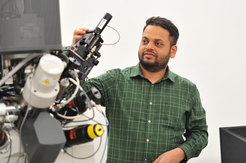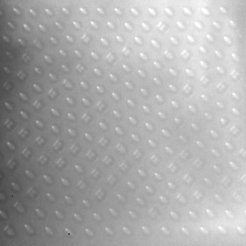Jagannath Jena receives the Otto Hahn Medal
Jagannath Jena receives the Otto Hahn Medal for advances in chiral spintronics
Postdoctoral Research Fellow at the Max Planck Institute of Microstructure Physics (MPI MSP) Halle receives the Otto Hahn Medal. Jagannath Jena is honored for his research in spintronic technologies for defining two different spin textures in one single material and reducing the significant error due to thermal fluctuation in racetrack devices. On 22 June 2022, the award, which is endowed with 7.500 euros, will be presented at the Max Planck Society’s Annual Meeting in Berlin.

Jagannath Jena will be awarded the Otto Hahn Medal for the year 2021 on the occasion of the Annual Meeting of the Max Planck Society on June 22, 2022 in Berlin. He is the first doctoral student in the Department of Nano-systems from Ions, Spins and Electrons (NISE) led by Prof. Stuart Parkin to win this award. The MPG honors Jena with this prestigious award for the fundamental and innovative research in chiral spintronics, most significantly, the discovery of several unique magnetic nano-objects in non-centrosymmetric Heusler compounds.
“The Otto Hahn Medal is one of the most distinguished honors a Ph.D. student can receive, and I am delighted to have received it. It feels wonderful when your research gets the recognition and your hard work acknowledged. This would not be possible without the support of my supervisor Prof. Stuart Parkin. I am extremely grateful for his guidance and constant encouragement.’’ says Jagannath Jena.
Jagannath started his doctoral studies at the Max Planck Institute of Microstructure Physics in 2016, shortly after Prof. Stuart Parkin joined the Max Planck Society. “Even though he was new to Lorentz transmission electron microscopy (TEM) techniques, I was impressed by his enthusiasm to learn and apply this sophisticated experimental technique to explore non-collinear spin textures in a variety of materials.” states Prof. Stuart Parkin.

Two different textures in one single compound
In his Ph.D. thesis on "Discovery of Co-existing Non-collinear Spin Textures in D2d Compounds" he successfully identified the existence of magnetic antiskyrmions and Bloch skyrmions in a fully stoichiometric inverse ferrimagnetic Heusler compound. His work was published in four publications in high-impact journals such as Nature Communications, Science Advances, Nano Letters and Advanced Materials. His thesis was recently chosen as ‘outstanding Ph.D. research’ and will be published into a book by Springer.
Jagannath is continuing his work at the Institute in the NISE Department led by Prof. Stuart Parkin and is looking forward on working on current driven dynamics of the skyrmions and emergent quantum phenomena arising from the interfaces of superconductivity and chiral magnetism.
About the Otto Hahn Medal
Every year since 1978, the Max Planck Society has awarded the Otto Hahn Medal to up to 30 young scientists and researchers for their outstanding scientific achievements, mostly in connection with their doctorate. The medal, which is endowed with 7,500 euros, aims to motivate talented young people to pursue a career in research. The award is presented during the Max Planck Society’s Annual Meeting.
As President of the Kaiser Wilhelm Society and winner of the 1944 Nobel Prize in Chemistry, Otto Hahn attended to the successful transformation of the Kaiser Wilhelm Society into the Max Planck Society starting in 1946. When the Max Planck Society was founded in Göttingen on 26 February 1948 to continue the work and the institutes of the Kaiser Wilhelm Society, he became the MPG’s first president.
One famous awardee of the Otto Hahn medal is Reinhard Genzel, Director at the MPI for Extraterrestrial Physics. He was awarded the 2020 Nobel Prize in Physics for his observations of the supermassive black hole at the center of our Milky Way. The first major research prize in his career was the Otto Hahn Medal, which he received in 1980.













